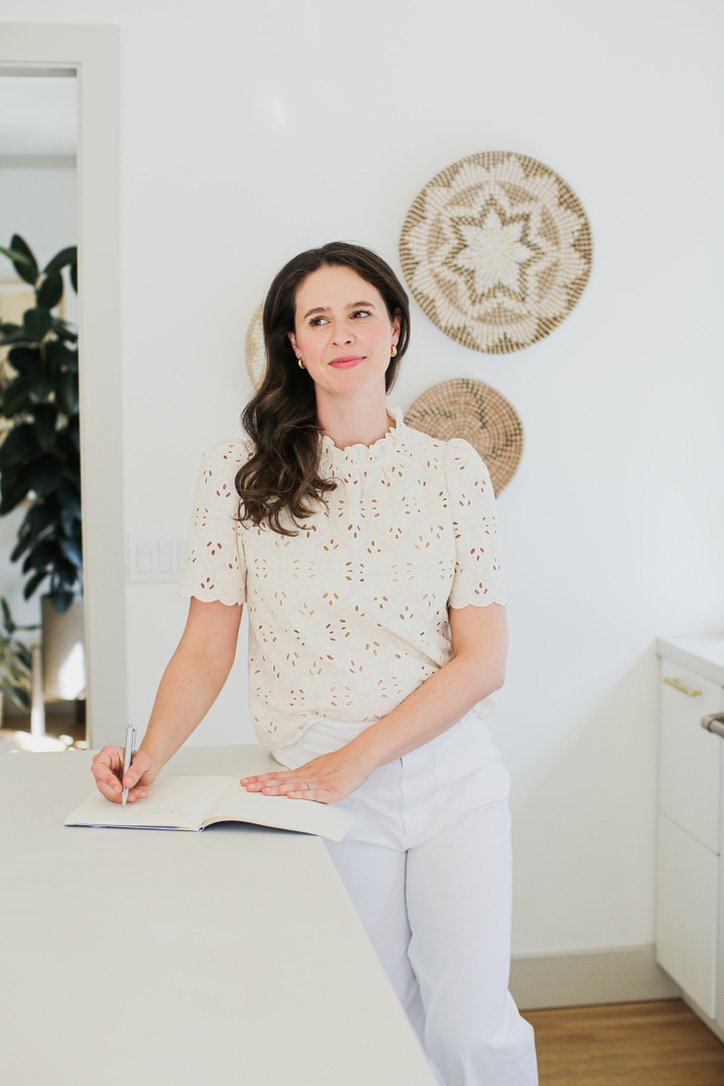Blog
Why I don't necessarily recommend hiding your anxiety, insecurity, or fear
A question for your weekend:
What would you gain if you let them see you accurately?
So many of us are holding up facades — facades that prevent the world from seeing our anxiety, our insecurity, our imposter-ness.
But what if you just... let other people see? I know it's a big ask, and perhaps one that is scary or complex to implement.
But the rewards are big, too. On a personal level, my coaching got a lot better when I decided to just let my clients see that sometimes I was nervous or unsure. In fact, I think I seemed a lot less nervous or unsure when I wasn't also trying to hide that from them.
And, perhaps even more importantly: it was so much less tiring. Holding up a facade takes an enormous amount of energy. You may have forgotten how much energy it takes if holding it up is your life-as-usual.
How much energy would you get back if you just let them see you accurately?
As always, I know you’ve got this.
Katie
Want to receive essays like this every Sunday morning? Sign up for my newsletter!
Two reminders about decision-making + what others will think
Two quick reminders about other people + decision-making:
1. Other people may not understand a decision you make, but that doesn’t mean it’s the wrong decision.
It’s simply the nature of life that sometimes you will make a decision that doesn’t make sense to them — or one that seems wrong or misguided.
No one — again, no one — will ever 100% “get you” like you get you. Even your soulmate. Even your best friend. Even your therapist.
(In other words: “This is your game.”)
2. Can you let them be wrong about you?
When other people doubt us, we often assume it means that we’re wrong.
But the Jedi-level Skill is the ability to do the opposite.
A Jedi has the capacity to say to herself: They’re simply mistaken.
And: I’m willing to let them be wrong about me.
…
I got this insight from Brooke Castillo, and it’s quite radical. If you can get comfortable with the idea that people will sometimes be wrong about you — and this can be okay, and you do not have to change their minds — you might just be ready to conquer the world.
(This is not, of course, to suggest that blind, unjustified confidence is the goal. It’s simply to say: the other person isn’t always right, either — and you get to decide what’s true.)
As always, I’m rooting for you. You’ve got this.
Katie
Sign up for my newsletter to get helpful + encouraging essays like this every Sunday morning. It’s free!
On whether people like you at that outdoor, COVID-safe cocktail party
Many of us (me included!) might — you know, just sometimes — get a little anxious in social situations.
Maybe when there’s a cool-looking person at a party you’d like to befriend.
Or at Thanksgiving with your in-laws.
Or even with one of your oldest friends.
Our anxieties can take many forms…
Do they find me interesting / funny / smart?
Do they find me attractive / sexy?
Would they rather talk to someone else?
Do they want to be my friend?
And yet, they all boil down to the same fear: Do they like me?
Today I wanted to offer you a new thought to think, when you are worried about whether other people like you.
Here it is:
Instead of worrying whether they like you, ask yourself: Do I like *them?*
Did you catch that?
Instead of worrying about whether they like you, ask yourself: Do I like them?
I’ve played with this idea, and it has really shifted things for me. Here’s what I’ve noticed:
1. In meeting new people
I have long had mild social anxiety — I usually get a little anxious at a dinner party of all new people, for example. I often found the thought flitting across my mind: Katie, you are awkward and they probably don’t find you as interesting as the other people here.
But once I stayed focused on whether I liked them, and whether I want to get to know them better, it really shifted things for me.
Instead of trying to control them (“please, won’t you like me?!”), I just started paying much closer attention to them — to what they were saying, and to their whole way-of-being. Did I find them warm? Deep? Thoughtful?
This was much more relaxing to me, and I’m sure it made the people I spoke with more relaxed, too.
It also helped me realize: I don’t actually want to become friends with most people. Of course, I’m capable of chatting with almost anyone, and will be kind and respectful to everyone I meet!
But if I don’t feel “lit up” by another person, it doesn’t actually matter if they’d rather talk to someone else. I feel the same way about them!
2. In existing relationships where I didn’t feel cherished.
I have a few existing relationships where I felt that the other person — in various ways — didn’t seem to put in the “friendship work” for us to connect. I didn’t feel particularly valued, and I might have even started to feel hurt.
Asking “Do I like them?” changed everything for me.
If I realized that I didn’t actually value them that much, then it was fine that they seemed to be a bit checked out from the relationship. I realized it would make sense for me to “check out” a bit, too.
If I realized that I did deeply value the relationship, then I was willing to do the majority of the “friendship work,” at least for the time being. It was a relationship I valued!
…
One more thing:
I was talking about this concept with a client recently, and she wondered whether it was a bit egotistical, to focus on whether she liked other people.
From my perspective, it’s actually the opposite.
When we’re worried whether the other person likes us, we are typically “performing” — trying to make ourselves liked. We’re not showing up with the authenticity that typically leads to the most meaningful, lasting relationships.
But when we ask whether we like them, we’re being honest — with ourselves, and with them. If the relationship does form, it forms on the foundation of authenticity and a true, genuine desire to connect. That’s the kind of friendship that will be best for them, and for you.
…
Here’s your homework:
In a social situation, when you notice yourself worried about being liked, ask: do I like them?
As always, I’m rooting for you. You’ve got this.
Katie
Sign up for my newsletter to get helpful + encouraging essays like this every Sunday morning. It’s free!
On "gravitational pulls" + other people's value systems
Here’s a life-changing question for you:
Are you allowing yourself to get trapped in the gravitational pull of other people’s value systems?
You know, the values of:
Your colleagues
Your boss
Your college or graduate school classmates
Your mom
Your friends
We choose our jobs based on what our business school classmates think a “good” job is. We chose our lunch based on what our mom would think was “healthy” or “reasonable.” We choose our outfits, our hair, our weekend activities, our partners, and our friends, based on someone else’s value system.
Sometimes the value system doesn’t belong to anyone we could explicitly identify. It’s just “the world.” The world says that if I don’t do my job this way, I’m a bad person! The world says that if I ask for this I’m greedy!
But: do we agree with that assessment?
Does that assessment reflect our true values?
…
The alternative, of course, is to be crystal clear on your authentic values and priorities… and live according to them.
For many of us, this feels impossible. We have no freaking clue what our values are. Or the gravitational pull of others’ values feels truly impossible to escape. Their values feel like "the truth” about life.
To which I would say:
It’s 100% possible to know your values, like your values, and live according to them.
Yep. I mean it.
You may face roadblocks, but they can almost always be addressed.
Many of us fear that addressing these roadblocks will feel like pushing enormous boulders across football fields. The truth? Far more often it is actually incremental, small shifts inside our own brains. This is at the core of much of the work I do with my 1:1 life coaching clients if it’s ever of interest. So this weekend, about any choice — small or large — you might ask yourself:
Am I choosing this based on my own values, or someone else’s?
So this weekend, about any choice — small or large — you might ask yourself: am I choosing this based on my own values, or someone else’s?
As always, I’m rooting for you. You’ve got this.
Katie
Did you like this essay? Sign up for my newsletter to get helpful + encouraging essays like this every Sunday morning. It’s free! :)




